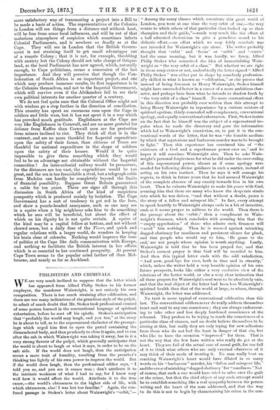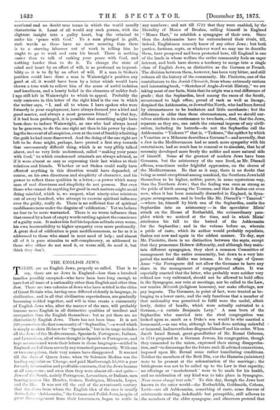PHILISTINES AND CRIMINALS.
WE are very much inclined to suppose that the letter which has appeared from Alfred Philip Stokes to his former employer, the murderer Wainwright, is not entirely his own composition. There is too much straining after edification, and there are too many indications of the grandiose style of the pulpit, to admit of much doubt that Mr. Stokes took professional counsel of some person learned in the conventional language of spiritual exhortation, before he sent off his epistle. Stokes's anticipation that "probably the world may laugh, and you too," at the story he is about to tell, as to the supernatural chaiacter of the prompt- ings which urged him first to open the parcel containing the dismembered body, and then prudently to close it again, and to run after the cab in which Wainwright was taking it away, has in it a very strong flavour of the pulpit, which generally anticipates that the world is about to laugh at what it says, in order to be on the safe side. If the world does not laugh, then the anticipation seems a mere trait of humility, resulting from the preacher's thinking too lightly of his own power to impress the world. But if the world does laugh, then the professional edifier says, "I told you so, and you see it comes true ; don't attribute it to the intrinsic weakness of what I had to say, for I knew very well how it would affect the world. Attribute it to the true cause,—the world's obtuseness to the higher side of life, with which obtuseness, alas! I was but too familiar." Again, the con- fused passage in Stokes's letter about Wainwright's "orbit,"—
"Among the many classes which constitute this great world of London, you were at one time the very orbit of one,—the very centre to which others of that particular class looked up as their champion and their guide,"—reads very much like the effort of a half educated rhetorician to give a grandiose sound to his
didactic effort,—an effort which we may fairly conclude was not intended for Wainwright's eye alone. The writer probably thought that ' orbit' and focus' or orbit' and centre' had the same meaning, but it was hardly, we fancy, Alfred Philip Stokes who conceived the idea of immortalising Wain- wright as " the very orbit of a class." But whether we are right in these conjeetures or not, undoubtedly the letter signed " Alfred Philip Stokes " was either put in shape by somebody profession- ally skilled in what is known as "edification," or else proves that instead of being foreman to Henry Wainwright, Stokes himself might have succeeded better in a career of a more ambitious char- acter, and perhaps have been what he intends to shadow forth by "the very orbit of a class" himself. No more conventional effort in this direction was probably ever written than this attempt to bring Henry Wainwright to repentance by a curious mixture of spiritual egotism, thinly-concealed self-complacency, conventional apology, and equally conventional exhortation. First, Stokes insists on the fact that he himself was the subject of a supernatural im- pulse when he made the discovery and gave the information which led to Wainwright's conviction, or, to put it in the con- ventional words of the letter, that he was "the humble medium by which that mysterious and barbarous murder was to be brought' to light." Then this experience has convinced him of "the existence of a Cod and a superhuman power over us," and he hopes it will convince Wainwright also. Then he asks Wain- wright's personal forgiveness for what he did under the over-ruling of this supernatural power, almost as if some apology were needed for following divine guidance in such a matter, instead of acting on his own instinct. Then he says it will assuage his regrets, to think in future years that he had assured Wainwright of the complete absence of any enmity towards him in his own heart. Then he exhorts Wainwright to make his peace with God, assuring him that there are many who know the desperate straits into which he was driven, "and that without a doubt, yours is the story of a fallen and misspent life." In fact, every attempt to speak heartily to Wainwright always ends in a bit of invective, such as it seems proper to address to the world. Then there is the passage about the orbit ;' then a compliment to Wain- wright's firmness, which concludes with assuring him that the " empty approbation" of those who admire such firmness will "avail" him nothing. Then he is warned against mistaking dogged obstinacy for manliness and persistent silence for pluck, and that people who would say. to him, Be game to the end,' are not people whose opinion is worth anything. Lastly, Wainwright is told that he has been prayed for, and that Stokes's earnest prayer is that God will be merciful to him. And then this typical letter ends with the odd valediction, "And now, good-bye for ever, both in time and in eternity," which, unless the writer held a very humble opinion of his own future prospects, looks like either a very exclusive view of the relations of the better world, or else a very clear intimation that all these prayers for Wainwright's soul were to be absolutely vain, and that the real object of the letter had been less Wainwright's spiritual health than that of the world at large, to whom, through Wainwright, the letter was addressed.
No trait is more typical of conventional edification than this last. The conventional edifiers never do really address themselves heart and soul to any one conscience ; they are always endeavour. ing to take other and less deeply burdened consciences at the rebound. They profess to be trying to reach the consciences of a particular class of sinners, and no doubt believe themselves to be aiming at this, but really they are only trying for new adhesions from those who do not feel the least in danger of that sin, but who like to have the occasion "improved" for them. 'That is not the way that the few have written who really do get at the heart. They are full of the actual case of moral guilt, far too full of it to think what others who are only external observers of it may think of their mode of treating it. No man really bent on reaching Wainwright's heart would have dilated in so many words on his " barbarous" murder, his "fallen and misspent life," and the error of mistaking " dogged obstinacy " for " manliness." Not of course, that such a one would have tried to salve over the guilt or the crime, but that the chief object of any such attempt would be to establish something like a real sympathy between the person writing and the heart of the man addressed, and that the way to do this is not to begin by characterising his crime in the con-
ventional and no doubt true terms in which the world usually characterise it. Least of all would any such person, with the slightest insight into a guilty heart, beg the criminal to
make, his peace with God.' To a man plunged in guilt, such words as these have no more meaning than there is to a starving labourer out of work in telling him he ought to go to work and earn his bread. There is nothing easier than to talk of making your peace with God, and nothing harder than to do it. To change the state of mind and heart by an effort of will, is as profound an impossi- bility.as it is to fly by an effort of will. If a man in Stokes's position could have done a man in Wainwright's position any good at all, it would have been by a letter which would have shown a-true wish to relieve him of the sense of awful isolation anctIoneliness, and a hearty belief in the elements of nobler feel- i ngs still left in Wainwright to which to appeal. Probably the only sentence in this letter of the right kind is the one in which the writer says, " I, and all to whom I have spoken who were formerly in your employment, have always deemed you a kind and -good master, and always a most generous friend." In that key, if it had been prolonged, it is possible that something might have been done to induce Wainwright, as one who had always loved to be-generous, to do the one right act then in his power by clear- ingthe innocent of all suspicion, even at the cost of frankly admitting the guilt he had once disavowed. And the doing of the one right act left to be done might, perhaps, have proved a first step towards that uncommonly difficult thing, which is so very glibly talked about, and so very little understood, called "making your peace with God," to which condemned criminals are always advised, as if it were almost as easy as expressing their last wishes to their relatives and friends. Whether or not Stokes could really have effected anything in this direction would have depended, of course, on his own directness and simplicity of character, and his power to reflect these qualities in a letter,—a power which many men of real directness and simplicity do not possess. But even those who cannot do anything for good in such matters might avoid -doing mischief, which is, we suspect, what ninety-nine ministers out of every hundred, who attempt to exercise spiritual influence over the guilty, really do. There is no sufficient fear of spiritual meddlesomeness under the disguise of ' edification.' Yet we believe no fear -te be more warranted. There is no worse influence than -thatcaused by a host of empty words rattling against the conscience of a guilty man. It makes him feel his hopeless solitude even worse, his own inaccessibility to higher sympathy even more profoundly. A great deal of edification is pure meddlesomeness, so far as it is addressed to those who stand in most need of help ; and almost all of it is pure stimulus to self-complacency, as addressed to those who either do not need it, or worse still, do need it, but think they don't.



































 Previous page
Previous page